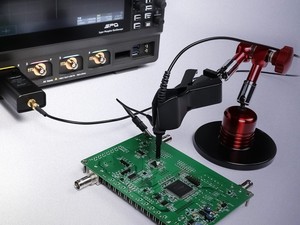Siglent’s power rail probe SAP4000P for power integrity measurements
Siglent releases SAP4000P 4GHz power rail probe, SP6150A 1.5GHz passive probe and SAP5000D 5GHz active differential probe new accessories.
SAP4000P power rail probe offers high bandwidth, high sensitivity, very low noise, an extra-large offset compensation and adopts SAPBus interface without external power supply. Excellent match for Siglent oscilloscopes with SAPBus interface, such as SDS3000X HD, SDS5000X, SDS6000 Pro, SDS7000A series oscilloscopes. The SAP4000P power rail probe is an excellent probe for power integrity measurements.
In recent years, with the rapid development of science and technology, the electronic designs require many different supply voltages to function properly, the circuit switching speed becomes faster, the chip package size is shrinking, the power supply network is becoming more and more complex, and the changing technology landscape means designers need higher accuracy measuring tools.
When measuring power ripple and noise, engineers often use passive probes to directly probe the power supply network near the chip to be measured. However, the measurement system composed of traditional oscilloscopes and probes would have too much noise, and when the power supply noise was very small, the noise would overwhelm the power supply noise, and engineers could not get accurate measurement results. Common passive probe attenuation multiplier of 1X, the bandwidth is very low only 6 MHz; and when the attenuation multiplier of 10X, the probe and the oscilloscope connected to the oscilloscope, and the bottom noise of the oscilloscope will be too large, which will affect the accuracy of the measurement results.
Siglent can provide customers with high-accuracy power rail measurement solution. The SAP4000P power rail probe covers power rail transient events up to 4 GHz, and its low-noise feature helps to differentiate between the oscilloscope and probe noise and the ripple and noise of the DC power supply under test. The ±24 V offset voltage range makes it easy to adjust dynamic signals with a DC component near the centerline of the oscilloscope’s screen, and it also offers a wide dynamic range of ±600mV, which on higher voltage rails, lets you look at droop on the line or when a lot of current is drawn by load or transients. In addition, the high 50 kΩ impedance at low frequencies eliminates load effects and minimizes interference with the power supply under test, while the low 50 Ω impedance at high frequencies matches coaxial cables and increases test bandwidth.
Engineers often need to verify multiple power rail signals, due to the small size and compact spacing of circuit components, oscilloscopes and the connection of the point under test is more complex and time-consuming, so the SAP4000P power rail probe provides a variety of accessories, such as dual-male SMA cable, high-frequency point probe, miniature SMD clips, can be flexibly set up a variety of connection methods, which greatly meets the needs of different application scenarios.
SAP5000D is a high-bandwidth differential active probe known for its features such as high bandwidth, low noise, and high input impedance, making it suitable for measuring high-speed signals. Its high input resistance and low input capacitance characteristics ensure minimal load introduced to the measurement system.
- Probe bandwidth: 5GHz
- Single-ended input resistance: 10kΩ
- Differential input resistance: 20kΩ
- Probe gain: ÷10
- Differential input capacitance: 400 fF
- ±2.5V input dynamic range
- ±12V offset voltage setting range
- SAPBus interface
This simultaneous release of new accessories for the SAP5000D active differential probes brings many conveniences and advantages to users, enhancing the functionality of the existing SAP5000D active differential probes, improving users’ efficiency and accuracy when using them, supporting more application scenarios, and helping users to better utilize the probes for efficient and accurate measurement work.
The SP6150A probes offer bandwidth of 1.5 GHz and 10:1 attenuation ratio to address a wide range of measurement needs. For general purposing probing, the SP6150A low capacitance and low inductance ground connection keep probe loading low enough to achieve high signal integrity measurements. The SP6150A passive probe offers a low input capacitance, 1.8pF, for measuring fast edges more accurately, making it a good low-cost alternative to an active probe.





